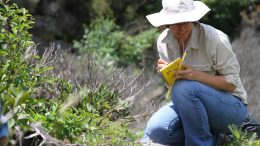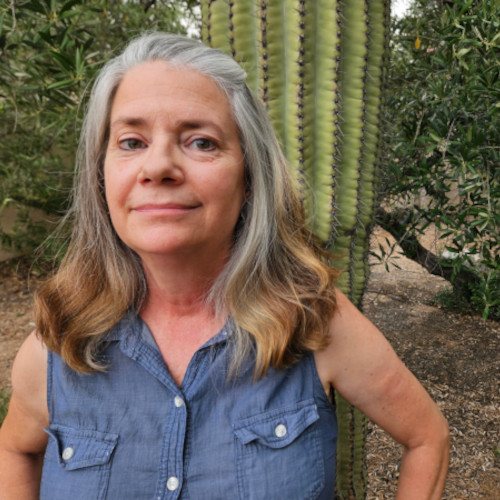Researchers in Indonesia recently captured a surprising event on video: A wild orangutan named Rakus, with a deep gash on his cheek, harvested liana leaves, chewed them up, and rubbed them on his wound. His cheek healed without infection. As it turns out the plants have anti-inflammatory, antibacterial, antifungal, and other chemical properties that help heal wounds.
The great ape saw the plant, recognized the plant, and valued the plant because he knew something about a subject that few humans do anymore: botany.
At a time when our net knowledge about plants keeps growing, our individual understanding of plants is in decline. This is unsurprising, because while we still depend on plants for life, few of us need to know much about them in our daily lives — as long as someone else does. We rely on botanists to identify plants, keep them alive, and in so doing help keep us alive as well.
It’s a lot of responsibility for a group of scientists that isn’t getting any bigger. And that has some people in the field worried.
Crunching Numbers
The National Center for Education Statistics triggered the first alarm about the future of botany in 2015. According to data released that year, the number of annual undergraduate, graduate, and doctoral degrees awarded in botany or plant biology in the United States had dropped below 400 for the fifth time since 2007. In 1988 the number of degrees was 545.
The number soon rose again and so far has stayed above 400. In fact it rose to 489 in 2023 — the highest in decades. (By comparison, American universities gave out more than 45,000 marketing degrees last year.)
The definitive downward trend, though, remains in the number of U.S. institutions offering botany or plant biology degrees — from 76 in 2002 to 59 in 2023.
“Botany Ph.D.’s are disappearing,” says Kathryn Parsley, who got her Ph.D. in biology, not botany, even though her dissertation focused on plants. “The number of botanists is declining rapidly and the people filling those spaces are not botanists.” When a biology department has a job vacancy, she says, they tend to hire a professor who has “nothing to do with plants. The department will have all kinds of scientists in it, with only one or maybe two botanists, sometimes only one or two plant scientists at all.” Because she attended one such school, “a botany degree was out of the question,” Parsley says.
While nobody has tracked the average age of botanists in the United States, students of “pure botany” do seem to be waning, according to Kristine Callis-Duehl, the executive director of education research and outreach at the Donald Danforth Plant Science Center in St. Louis. “Skills are shifting away from old-school botany. A lot of that’s being driven by funding sources,” she says. “More and more, just being a botanist is not enough in academia.”
Follow the Funding
Experts agree that in recent years, most botany professors aren’t being replaced once they retire. But why?
Money is one reason. The National Science Foundation, for instance, has shifted its funding away from natural history at herbariums and other museums, Callis-Duehl says. “It’s harder to convince Congress that that work — pure botany — contributes to the economy. They prefer basic science that can lead into more applied science, where they can make a case that it fuels the U.S. economy.”
Applied plant science has more NSF options than botany. For example, agriculture is more likely to be funded by USDA, Callis-Duehl says.
Those federal budget decisions shape university budget decisions, she says. The drop in research funding for pure botany has “tanked those programs at schools across the country,” she explains, including two that she attended. “Both saw they weren’t getting the federal funding to justify the existence of a botany department anymore. I see it over and over and over again.”
But shifting funding still begs the question of underlying causes. Some degrees go away because the world no longer needs them, but the world still needs plants and plant knowledge. So why is pure botany in decline?
“A Green Curtain”
For many people, the world’s flora registers as what Parsley calls “a green curtain” — a backdrop for more interesting objects of their attention such as animals or, better yet, other humans. By failing to really notice and distinguish one plant from another, we care less about plant knowledge or even plant survival, she says. And that lack of interest can be profound.
“You can’t talk about the decline in botanists without talking about plant blindness,” Parsley says.
Plant blindness is a term coined in 1998 by two American botanists. They defined it as “the inability to see or notice the plants in one’s own environment,” leading “to the inability to recognize the importance of plants in the biosphere and in human affairs.”
Parsley wrote her dissertation on a related phenomenon called plant awareness disparity, which refers to the difference between how we notice and treat plants versus animals. She believes this difference is another reason botany degrees are disappearing. “People think plants are boring. Nobody wants to learn about them.”
Across the Pond
This trend is not unique to the United States. As botany professors retire in the United Kingdom many are not being replaced; fewer students are getting degrees in botany, according to Sebastian Stroud, a teaching fellow at the University of Leeds who, in a 2022 paper, coined the phrase “the extinction of botanical education.”
As in the United States, applied plant science attracts more funding there.
Yet as the winds of restoration begin to blow, the UK has a growing need for people who can identify plants, a set of skills that Stroud says is currently lacking in favor of other plant skills.
Early this year a law intended to reverse the UK’s decline of nature took effect. Biodiversity Net Gain mandates that when developers undertake a project, they must provide a net gain of at least 10% biodiversity, either by creating or enhancing habitat. The idea is to leave the land in a measurably better state than it was before the development.
Restoring degraded ecosystems means many projects will need to hire botanists. These jobs are not in academia but industry, where ecological consultants with strong botany skills identify endangered plants on a site and deliver surveys of what they find.
“They need competent ecologists to understand an area,” Stroud says. “There are lots of jobs and not enough botanists, a real skill gap for the industry. That’s where the real concern is, because if we want to restore nature, we need to have good baseline data.”
At present there’s a gap between what the UK needs — students with a strong understanding of plant identification — and what its schools have been producing. Recent job candidates “didn’t have the identification skills, practical skills, required for extensive surveying work,” Stroud says. “The UK has multiple plant bio-tech programs, few on taxonomy and ecology, species identification or conservation. Reviews by the UK House of Lords identified taxonomy as a science being in a critical state.” A more recent report from the Royal Society of Biology found that “96% of organizations surveyed expressed concerns over gaps in the skills of UK plant scientists.”
Plant taxonomy is the branch of botany that identifies, classifies, and names plants based on their similarities and differences. Increasingly, ecological consultants are taking Stroud’s courses in plant ecology and identification, he says, “because they need to upskill for habitat survey. There are not enough places to accredit professionals in the industry. We can’t meet the demand or deliver enough students and accreditations quick enough.”
A Rose by Any Other Name
The world still needs botanists. In prior generations older botany professors were mostly training younger botany professors. Today’s students, however, are often migrating to other plant majors.
That doesn’t necessarily mean plant knowledge is being lost. It means, according to two 2023 papers, that there’s a mismatch between the careers for which current graduate students are being trained and the careers they’re more likely to end up with. One study found that few of those careers will be in academia. According to the second study, the jobs now are and increasingly will be in the private, nonprofit, and government sectors.
For example, “government employers discussed skills they’re looking for in new hires — plant identification was the number-one skill,” says Callis-Duehl, one of the authors of both studies.
This trend has been growing for a while: In 2018 the National Park Service and Bureau of Land Management — which in combination control more lands than any other U.S. agencies —indicated they can’t find enough botanists to deal with invasive plants, wildfire reforestation, and basic land management.
In response to this need, dozens of U.S. legislators have sponsored something called the Botany Bill, which has been introduced twice to the House of Representatives and the Senate. The bill is intended to promote botanical research, generate demand for native plant materials, and protect native ecosystems. It has yet to pass, but its existence suggests a growing recognition that plant knowledge needs to be preserved.
And although the emphasis on pure botany is decreasing, botany may be evolving rather than tapering off. “A lot of botany degrees are becoming joint degrees with, say, ecology,” according to Callis-Duehl.
Stroud agrees. “Just because we don’t have many botany students doesn’t mean there aren’t students of botany,” he says. The same applies to teachers like himself. With his Ph.D. in urban ecology, he isn’t a botany professor by name. Yet he teaches plant content, including those valuable plant-identification skills.
“You don’t necessarily need to be professionally accredited to be a botanist,” Stroud says. “Many people who we might describe as botanists might not identify as botanists. They might call themselves something else. Botany is a broad church.”
Still, both Stroud and Callis-Duehl acknowledge that some skillsets like taxonomy are being lost as the botany field contracts. Plant knowledge lives on in some form, she says. But for now the plant skills that employers seek — and that our planet needs — appear to be in short supply.
Previously in The Revelator:
Rock and Roll Botany: An Endangered Plant Named After Legendary Guitarist Jimi Hendrix





